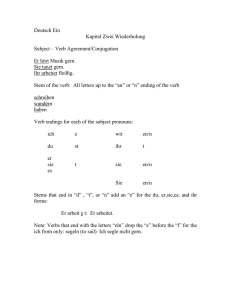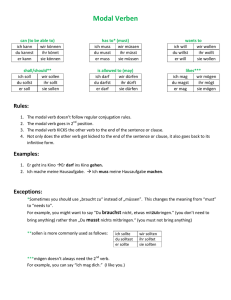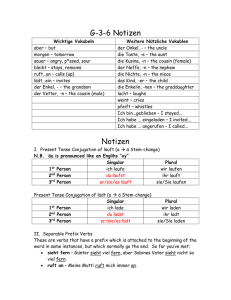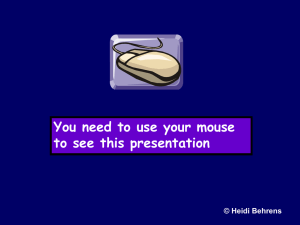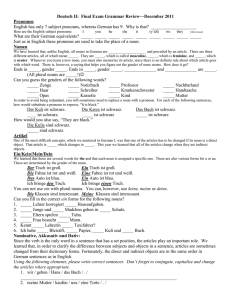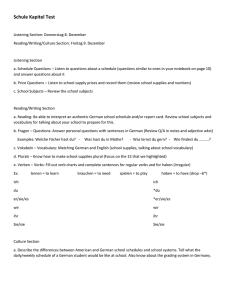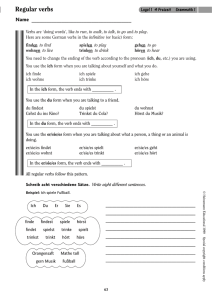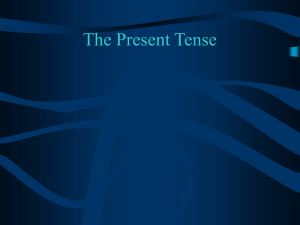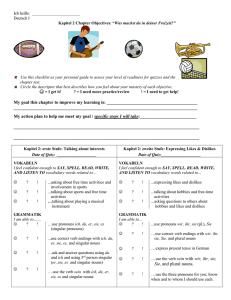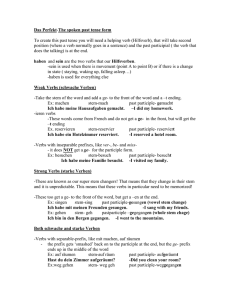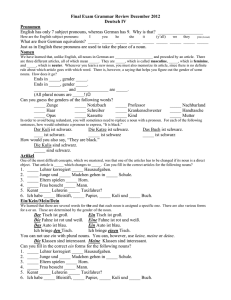Reflexive Verben
Werbung
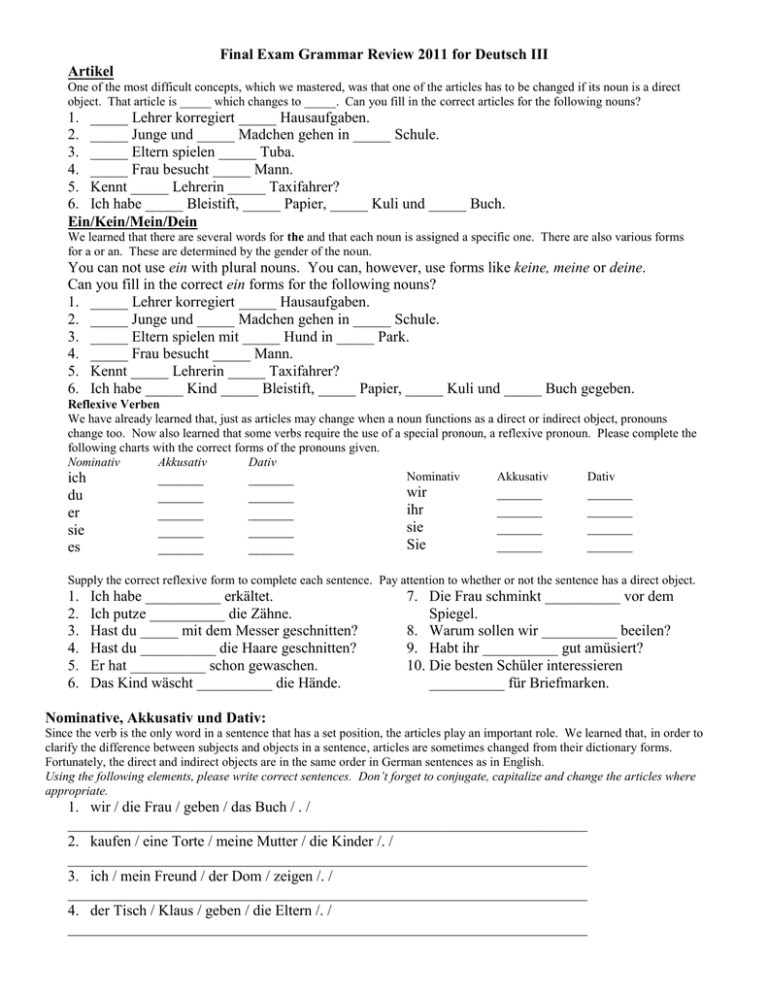
Final Exam Grammar Review 2011 for Deutsch III Artikel One of the most difficult concepts, which we mastered, was that one of the articles has to be changed if its noun is a direct object. That article is _____ which changes to _____. Can you fill in the correct articles for the following nouns? 1. _____ Lehrer korregiert _____ Hausaufgaben. 2. _____ Junge und _____ Madchen gehen in _____ Schule. 3. _____ Eltern spielen _____ Tuba. 4. _____ Frau besucht _____ Mann. 5. Kennt _____ Lehrerin _____ Taxifahrer? 6. Ich habe _____ Bleistift, _____ Papier, _____ Kuli und _____ Buch. Ein/Kein/Mein/Dein We learned that there are several words for the and that each noun is assigned a specific one. There are also various forms for a or an. These are determined by the gender of the noun. You can not use ein with plural nouns. You can, however, use forms like keine, meine or deine. Can you fill in the correct ein forms for the following nouns? 1. _____ Lehrer korregiert _____ Hausaufgaben. 2. _____ Junge und _____ Madchen gehen in _____ Schule. 3. _____ Eltern spielen mit _____ Hund in _____ Park. 4. _____ Frau besucht _____ Mann. 5. Kennt _____ Lehrerin _____ Taxifahrer? 6. Ich habe _____ Kind _____ Bleistift, _____ Papier, _____ Kuli und _____ Buch gegeben. Reflexive Verben We have already learned that, just as articles may change when a noun functions as a direct or indirect object, pronouns change too. Now also learned that some verbs require the use of a special pronoun, a reflexive pronoun. Please complete the following charts with the correct forms of the pronouns given. Nominativ Akkusativ Dativ Nominativ Akkusativ Dativ ich ______ ______ du er sie es ______ ______ ______ ______ ______ ______ ______ ______ wir ihr sie Sie ______ ______ ______ ______ ______ ______ ______ ______ Supply the correct reflexive form to complete each sentence. Pay attention to whether or not the sentence has a direct object. 1. 2. 3. 4. 5. 6. Ich habe __________ erkältet. Ich putze __________ die Zähne. Hast du _____ mit dem Messer geschnitten? Hast du __________ die Haare geschnitten? Er hat __________ schon gewaschen. Das Kind wäscht __________ die Hände. 7. Die Frau schminkt __________ vor dem Spiegel. 8. Warum sollen wir __________ beeilen? 9. Habt ihr __________ gut amüsiert? 10. Die besten Schüler interessieren __________ für Briefmarken. Nominative, Akkusativ und Dativ: Since the verb is the only word in a sentence that has a set position, the articles play an important role. We learned that, in order to clarify the difference between subjects and objects in a sentence, articles are sometimes changed from their dictionary forms. Fortunately, the direct and indirect objects are in the same order in German sentences as in English. Using the following elements, please write correct sentences. Don’t forget to conjugate, capitalize and change the articles where appropriate. 1. wir / die Frau / geben / das Buch / . / _____________________________________________________________________ 2. kaufen / eine Torte / meine Mutter / die Kinder /. / _____________________________________________________________________ 3. ich / mein Freund / der Dom / zeigen /. / _____________________________________________________________________ 4. der Tisch / Klaus / geben / die Eltern /. / _____________________________________________________________________ 5. ein Kind / die Bonbons / Axel und Manfred / kaufen /. / _____________________________________________________________________ Nominative, Akkusativ und Dativ: Using the sentences that you just created, rewrite them changing all of the nouns to pronouns. Don’t forget that the word order may change. 1. wir / geben / die Frau / das Buch / . / _____________________________________________________________________ 2. meine Mutter / kaufen / die Kinder / eine Torte / . / _____________________________________________________________________ 3. ich / zeigen / mein Freund / der Dom / . / _____________________________________________________________________ 4. Klaus / geben / die Eltern / der Tisch / . / _____________________________________________________________________ 5. Axel und Manfred / kaufen / ein Kind / die Bonbons / . / _____________________________________________________________________ Adjektivendungen Since articles and, therefore, gender is rather important in German grammar, several elements work together to be sure that the gender of a noun is clear. This semester we have worked extensively with adjectives. We learned some easy rules for determining what to put on adjectives when they come in front of nouns. Those rules were: When an adjective comes before a noun, it must have an ending. Beispiele: Das ist das rote Auto. Das Auto ist rot--. If an article does not show the gender of the noun, the adjective must tell the gender of the noun. When the article is present and does tell the gender, an –e is placed on the end of the adjective. Beispiele: Das ist das rote Auto. Ein rotes Auto steht da. If the article changes from it original dictionary form, an –en is placed on the end of the adjective. Beispiele: Ich kenne den netten Mann Er kommt mit dem roten Auto. Apply those rules in order to provide the correct ending for each adjective. Your choices are –e, -en, -er, -es, and --. 1. 2. 3. 4. 5. 6. 7. 8. 9. Wo ist der letzt__ Brief von Hans? Ich kaufe den klein__ Tisch. Er kommt mit dem nächst__ Bus. Das ist ein klein__ Tisch. Der klein__ Tisch ist hübsch__. Sein jünger__ Bruder heißt Willi. Hans schreibt einen lang__ Brief. Er geht zu einem gut__ Zahnarzt. Wir kaufen diese braun__ Jacke. 10. Es steht auf der nächst__ Seite. 11. München ist eine schön__ Stadt. 12. Der Brief ist von meiner nett__ Oma. 13. Arm__ Frau Braun! 14. Ich habe das neu__ Lied gelernt. 15. Du schläfst in dem klein__ Zimmer. 16. Ich kenne ein ander__ Mädchen. 17. Er ist in einem groß__ Zimmer. 18. Das Buch ist sehr interessant__. Regulare Verben im Präsens Verbs are words which show action in a sentence. In German all verbs end in either _____ or _____. Before you can use them in a sentence, you must conjugate them. That means that you change them so that they match the subject. This simple three-step process consists of: 1. Taking off the ______________________. 2. Writing down the ____________________ after each subject pronoun. 3. Adding the _________________________. Let’s see if you can apply the rules to the following verbs. machen tun -ich ____________ ____________ -du ____________ ____________ -er,sie,es ____________ ____________ -ihr ____________ ____________ -wir,sie,Sie ____________ ____________ Some verbs, however, need special attention. They need to add or delete a letter in order to make pronunciation easier. Can you conjugate these verbs? wandern arbeiten finden heissen tanzen -ich ____________ ____________ ____________ _________ ______ -du ____________ ____________ ____________ _________ ______ -er,sie,es ____________ ____________ ____________ _________ ______ -ihr ____________ ____________ ____________ _________ ______ -wir,sie,Sie ____________ ____________ ____________ _________ ______ Which form did you have to change for wandern? __________ What did you have to add to arbeiten and finden? __________ What did you leave off of heissen and tanzen? __________ Irregulare Verben Though most verbs are regular, there are some verbs which have to be memorize. Fortunately there are very few of these. Two, however, are: seinhaben werden which means ___ ___ which means ___ _______ which means ___ _______ -ich __________ __________ __________ -du __________ __________ __________ -er,sie,es __________ __________ __________ -ihr __________ __________ __________ -wir,sie,Sie __________ __________ __________ The rest of the irregular verbs have an easy pattern for conjugation. Do you know how to conjugate the following irregular verbs? fahren laufen sprechen essen sehen lesen -ich __________ _________ __________ __________ __________ ______ *du __________ _________ __________ __________ __________ ______ *er,sie,es __________ _________ __________ __________ __________ ______ -ihr __________ _________ __________ __________ __________ ______ -wir,sie,Sie __________ _________ __________ __________ __________ ______ What are the only two conjugations that differ from the way you do a regular verb? _____ and _____ What did you change about these forms for fahren and laufen? The ____ changed to an _____. for sprechen and essen? The ____ changed to an _____. for sehen and lesen? The ____ changed to an _____. Modal Verben Modal verbs express how one ______ about an action. They do not express the action itself; therefore, they must accompany an action verb. These verbs have a different way of conjugating. können müssen sollen dürfen -ich ____________ ____________ ____________ _________ -du ____________ ____________ ____________ _________ -er,sie,es ____________ ____________ ____________ _________ -ihr ____________ ____________ ____________ _________ -wir,sie,Sie ____________ ____________ ____________ _________ Wollen and mögen also modal verbs. (Möchten acts like a modal verb as well.) When there is more than one verb in a sentence, they cannot both be in the coveted second position. One must go to the end of the sentence, my friend. Can you rewrite these sentences to include the modal verbs? Remember the C-clamp! Ich spiele Tennis. (mögen) _____________________________________________ Gehst du ins Kino? (wollen) _____________________________________________ Trennbare Verben There are some verbs that are made up of two parts, a prefix and the verb itself. In English the equivalents of these verbs tend to have prepositions. When we conjugate these, they split in half and the prefix goes on the end of the sentence. (einkaufen) Ich __________ bei Kroger’s _____. (mitkommen) __________ du morgen _____? (aufräumen) Wir __________ das Zimmer _____. (aufmachen) Ihr sollt das Paket _______________. Wortstellung In addition to learning lots of vocabulary and memorizing the articles, we also learned how to put the vocabulary into sentences. When we do that, what is the normal order for a statement? ______ then _______ for a question? ______ then _______ Perfekt Once we mastered all of those basic concepts, we learned how to communicate in the conversational past tense. This form requires a helping verb and a past participle. The formula for making this tense with weak verbs is: __________ + _ _ + ________ + _ This formula is slightly altered if the verb has an inseparable prefix, a separable prefix or if it is French! Can you write the following sentences in the past tense? 1. Ich spiele Tennis Ich __________ Tennis ____________________. 2. Wir tanzen nicht gern. _____________________________________________________ 3. Kaufst du ein? _____________________________________________________ 4. Ihr besucht die Oma. _____________________________________________________ 5. Vati repariert mein Fahrrad. _____________________________________________________ For strong verbs, you had to determine which helping verb to use and had to memorize the past participle. 1. Die Kinder essen kein Gemüse. _____________________________________________________ 2. Trinkst du Milch? _____________________________________________________ 3. Fritz und ich schlafen im Park. _____________________________________________________ 4. Ingo geht nach Hause. _____________________________________________________ 5. Ich bin 14 Jahre alt. _____________________________________________________ When would you use sein as the helping verb? ______________________________________________ Präteritum As with English, there are ___ different ways to make past tense. The Imperfect (Präteritum) is the one word form of the past tense. It is used for ________________ about past events, except when writing personal letters. All of these are conjugated like modal verbs; however, there is only a formula for the weak verbs: _______________ + _____ + modal conjugation Can you write the following sentences in the imperfect tense? 1. Ich spiele Tennis Ich _______________ Tennis. 2. Kaufst du ein? _____________________________________________________ 3. Vati repariert mein Fahrrad. _____________________________________________________ 4. Ihr besucht die Oma. _____________________________________________________ 5. Wir tanzen nicht gern. _____________________________________________________ For strong verbs, you had to memorize the imperfect form and conjugated it like a modal verb. 1. Ich bin 14 Jahre alt. _____________________________________________________ 2. Trinkst du Milch? _____________________________________________________ 3. Ingo geht nach Hause. _____________________________________________________ 4. Fritz und du schlaft im Park. _____________________________________________________ 5. Die Kinder essen kein Gemüse. _____________________________________________________ Plusquamperfekt This is our third form of past tense, the past perfect tense. It is made up of elements of both of the previous forms. The basic formula for weak verbs is: ________ or ________ (conjugated like a modal verb)... ___ + _________ + __ Can you write the following sentence in the past perfect? 1. Wir spielen Tennis. Wir __________ Tennis ____________________. 2. Goethe ist 15 Jahre alt. _____________________________________________________ 3. Ich habe Kopfschmerzen. _____________________________________________________ Futurum The future tense in German is taken care of by simply using the verb werden (to be going to or to become). As with the modal verbs, this verb simply expresses the subject’s intentions towards the action verb. Since this means that there will be two verbs needed to complete the idea, the C-clamp structure will be used. The conjugations of werden were covered previously. 1. Ich reise nach Berlin. _____________________________________________________ 2. Wir sehen fern. _____________________________________________________ In addition to these topics, we also covered relative clauses, genetive case, object pronouns, accusative, dative and two-way prepositions and verbs with prepositions. These are covered on the practice test and will be on the final exam. We have also covered several different vocabulary topics. Be sure to review that vocabulary, as it will play a role. Know the nouns and their articles! Dependent Clauses: When you combine sentences in German, you have to alter the word order in the dependent clause. This means that you kick the verb to the _____ of the clause. Combine the following sentences with weil or dass. 7. Meinst du? Wir könne sein Autogramm bekommen. ________________________________________________________________________ 8. Wir rachen nicht. Es schadet unsere Gesundheit. ________________________________________________________________________ 9. Das Auto hat 50.000 Euro gekostet. Ich habe gehört. ________________________________________________________________________ 10. Ihr habt kein Geld. Ihr solltet kein Auto kaufen. ________________________________________________________________________ Combine the following sentences using a relative pronoun. Don’t forget to change the word order. Ich sah den Mann. Der Mann arbeitet im Café. Ich sah den Mann, der im Café arbeitet. Das ist der Mann. Der Mann arbeitet in dem Geschäft. ________________________________________________________________________ Ich wollte den Hund kaufen. Der Hund war sehr groß. ________________________________________________________________________ Wer war das Mädchen? Das Mädchen war gerade hier. ________________________________________________________________________ Ich suche die Frau. Ich habe der Frau ein Buch geliehen. ________________________________________________________________________ Questions for Frau Dieckman????? Email [email protected] Ich lebe für Grammatik! Starring: Europa-Karte der Zug die Stadt/Schilder Oktoberfest Stammbaum Weihnachten Geschichte Nominativ, Akkusativ, Dativ und Genetiv Pronomen im Nominativ, Akkusativ und Dativ Nebensätze mit weil, dass, als, wenn and wann Relativsätze Präpositionen Adjektiven und Adverbien
